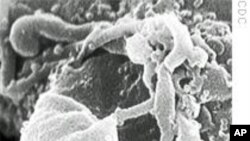Scientists have discovered that the AIDS virus destroys the immune system by infecting a relatively few number of cells that create a fiery pathway that consumes nearby cells. Finding could lead to treatments to dampen disease activity.
Scientists have long known that HIV sets up little biological factories inside the the body's protective CD-4 T cells they infect, producing millions of copies that eventually lead to a massive destruction of the immune system. Until now, investigators have not understood why the virus becomes so aggressive.
It turns out HIV, which infects only a small number of T cells at the start, destroys approximately 95 percent of immune cells through a process known as the bystander effect.
Warner Greene, head of virology and immunology at the Gladstone Institutes in California, says bystander cells that are in the neighborhood of HIV-infected cells succumb to a fiery death.
“Most CD4-T cells during HIV infection die not because of the toxic effect of the virus, but because of an immune response against the virus. So, CD4 cell depletion is more of a suicide than a murder," said Greene.
Gladstone scientists have discovered that the bystander cells become massively inflamed, releasing a protein called capcaisin-1 that recruits other immune system T cells to the site of the infection to try to put out the fire. But the new cells also become inflamed and self-immolate.
That turns out to be good news in the sense that inflammation can be quelled with existing drug compounds.
Greene says researchers have tested three agents in the laboratory, including one developed to treat epilepsy. He says all three compounds have worked very well to manage the inflammation.
While anti-inflammatory drugs would not be a cure for the AIDS virus, Greene says they could potentially keep the disease in check in some 16 million people worldwide infected with HIV who can’t access antiretroviral drugs but may in the future. Greene also envisions using anti-inflammatory compounds in combination with anti-AIDS drugs.
“Perhaps with people who have rapidly progressive disease, perhaps for people who are failing current antiretroviral therapy, they would go on this treatment. And even people who are well-controlled on antiretroviral therapy, we know there is chronic, persistent inflammation," he said.
Such inflammation can cause heart disease and cancer in HIV-infected individuals at an early age.
Warner Greene and colleagues report their findings in the journals Nature and Science.
Scientists have long known that HIV sets up little biological factories inside the the body's protective CD-4 T cells they infect, producing millions of copies that eventually lead to a massive destruction of the immune system. Until now, investigators have not understood why the virus becomes so aggressive.
It turns out HIV, which infects only a small number of T cells at the start, destroys approximately 95 percent of immune cells through a process known as the bystander effect.
Warner Greene, head of virology and immunology at the Gladstone Institutes in California, says bystander cells that are in the neighborhood of HIV-infected cells succumb to a fiery death.
“Most CD4-T cells during HIV infection die not because of the toxic effect of the virus, but because of an immune response against the virus. So, CD4 cell depletion is more of a suicide than a murder," said Greene.
Gladstone scientists have discovered that the bystander cells become massively inflamed, releasing a protein called capcaisin-1 that recruits other immune system T cells to the site of the infection to try to put out the fire. But the new cells also become inflamed and self-immolate.
That turns out to be good news in the sense that inflammation can be quelled with existing drug compounds.
Greene says researchers have tested three agents in the laboratory, including one developed to treat epilepsy. He says all three compounds have worked very well to manage the inflammation.
While anti-inflammatory drugs would not be a cure for the AIDS virus, Greene says they could potentially keep the disease in check in some 16 million people worldwide infected with HIV who can’t access antiretroviral drugs but may in the future. Greene also envisions using anti-inflammatory compounds in combination with anti-AIDS drugs.
“Perhaps with people who have rapidly progressive disease, perhaps for people who are failing current antiretroviral therapy, they would go on this treatment. And even people who are well-controlled on antiretroviral therapy, we know there is chronic, persistent inflammation," he said.
Such inflammation can cause heart disease and cancer in HIV-infected individuals at an early age.
Warner Greene and colleagues report their findings in the journals Nature and Science.




